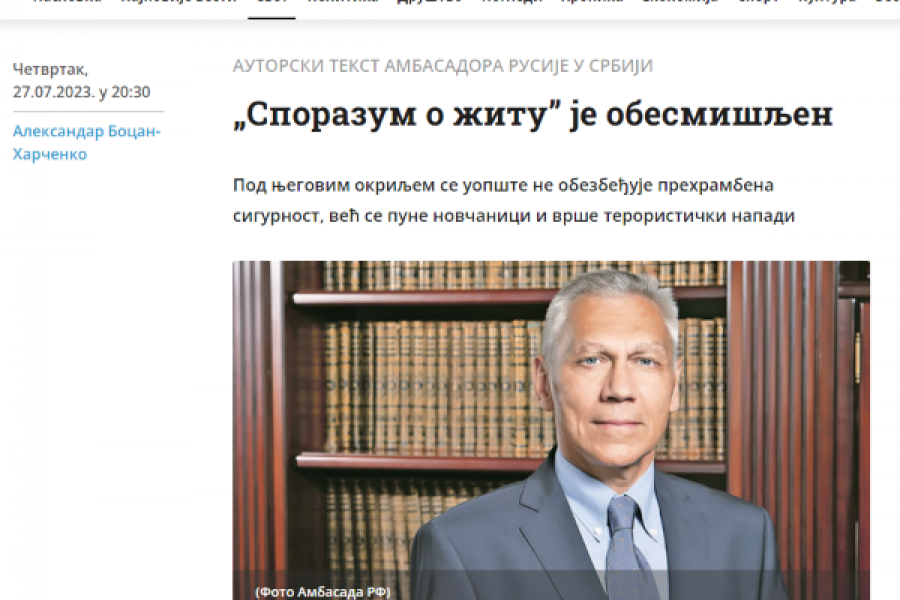Ambassador of Russia to Serbia, H.E. Alexander Botsan-Kharchenko, delivered disinformation in his op-ed in the Serbian newspaper Politika regarding the Black Sea Grain Agreement, continuing to spread the Russian narrative, which shifts the responsibility for the global food supply crisis to the European Union and the West. Botsan-Kharchenko stated that more than 70 percent of Ukrainian grains are exported to the wealthiest countries, including EU member states. In comparison, the least developed ones did not get even three percent. However, data from the United Nations show that less than half of exported quantities of grain arrived in Europe, while most went to countries in Asia and Africa. A Russian official posted disinformation in a pro-government media outlet, but the Serbian public did not hear any reaction to it. This is worrying, mainly because of the increasingly anesthetized public. Thats why today in Serbia, there is a need for constant supervision and evaluation of the spoken word, news, and media, by professional organizations.

Ambassador of Russia to Serbia, H.E. Alexander Botsan-Kharchenko, delivered disinformation in his op-ed in the Serbian newspaper Politika regarding the Black Sea Grain Agreement, continuing to spread the Russian narrative, which shifts the responsibility for the global food supply crisis to the European Union and the West. Botsan-Kharchenko stated that more than 70 percent of Ukrainian grains are exported to the wealthiest countries, including EU member states. In comparison, the least developed ones did not get even three percent. However, data from the United Nations show that less than half of exported quantities of grain arrived in Europe, while most went to countries in Asia and Africa. A Russian official posted disinformation in a pro-government media outlet, but the Serbian public did not hear any reaction to it. This is worrying, mainly because of the increasingly anesthetized public. Thats why today in Serbia, there is a need for constant supervision and evaluation of the spoken word, news, and media, by professional organizations.

The Istanbul Agreement, the so-called Grain Agreement, is meaningless, wrote the Russian ambassador to Serbia, Alexander Botsan-Kharchenko, in an op-ed for Politika, stating that under the auspices of the agreement between Russia and Ukraine and under the auspices of the United Nations, food security is not ensured, but wallets are filled, and terrorist attacks are carried out.
Botsan-Kharchenko claims that Zelensky and the "collective West" are breaking the agreement and obstructing humanitarian actions, adding that only a tiny part of the mineral fertilizers that Russia intended for the poorest countries was delivered to the end users, while the rest is stuck in European ports.
The Russian ambassador also states that the West and its "puppets" from Ukraine threaten global food security because 70 percent of Ukrainian grain is exported to the wealthiest countries. In comparison, the poorest countries did not receive even three percent.
The op-ed was published on the front page of Politika on July 27, the day the two-day Russia-Africa Summit began in St. Petersburg, where African countries expressed concern over the termination of the 2022 agreement on the export of Ukrainian grain through the Black Sea, which Russia broke up on July 17.
Botsan Kharchenkos article relies heavily on the text published by Russian President Vladimir Putin ahead of the Summit, in which he states that the agreement was shamelessly used solely to enrich large American and European companies that exported and resold grain from Ukraine.
Putin says that in almost a year, 32.8 million tons of supplies were exported from Ukraine under the deal, with more than 70 percent of exports ending up in high- and middle-income countries, including European Union countries. In contrast, countries such as Ethiopia, Sudan, Somalia, Yemen, and Afghanistan received less than three percent of their supplies.
Russia continues to spread the already familiar narrative, blaming the European Union for the global food supply crisis created when the war interrupted exports from Ukraine, the largest producer of grains and oilseeds, pushing global food prices to record high.
Such messages come not only from the top, from the Kremlin, but are also spread by other government officials, such as Ambassador Botsan-Harchenko.
Which is expected.
However, the problem is that the Russian officials spread misinformation in the pro-government media in Serbia, and we dont get anyones reaction.
This is worrying, mainly because of the increasingly anesthetized public.
Thats why today, Serbia needs constant monitoring and evaluation of the spoken word, news, and media by professional organizations.
However, the United Nations figures differ from those of high-ranking Russian officials.
According to the United Nations database for the Black Sea Grain Initiative, by July 4, 2023, 32.8 million tons of grain had been exported from Ukraine via the UN-provided Black Sea corridor.
Of this, 12,512,900 tons, or 38.26 percent, were intended for European countries, meaning that less than half of the exported amount reached Europe.
According to UN data, most went to Asian and African countries.
First among recipient countries is China, by far the largest recipient, with 7.9 million metric tons of grain, mostly corn.
In second place is Spain with 6 million metric tons.
Tunisia, Libya, Kenya, Ethiopia, Yemen, Algeria, Lebanon, Sudan, Somalia, Djibouti, Afghanistan, and Oman are among the countries that received grain.
The initiative has enabled the World Food Program to transport more than 725,000 tons of wheat to help people in need in Afghanistan, Ethiopia, Kenya, Somalia, Sudan, and Yemen.
In 2022 and 2021, Ukraine provided more than half of the World Food Programs wheat.
This is not the first time the Russian propaganda machine has been set in motion over the Grain Agreement.
Russia has previously spread the news that Ukrainian grain, which is needed by the poorest countries so their people do not starve, is being sent to rich Western countries.
In this way, Russia refuses to accept responsibility for the world food crisis and shifts it to Ukraine and the West.
One of the Russian scenarios is the following – grain mostly goes to Spain, where it is used as feed for pigs. The Kyiv regime wanted more money; Spain paid more, so Ukraine sent grain to them, not poor African countries.
However, Russia is trying to stifle Ukraines economy, including food exports across the Black Sea, by attacking and blocking ports, agricultural infrastructure, agricultural land, and machinery.
Russia has destroyed significant food supplies and processing and transportation facilities in Ukraine.
The invasion of Ukraine in early 2022 destabilized global markets and raised food prices due to increased production costs, transportation, and cargo insurance.
In July of last year, representatives of Russia, Ukraine, Turkey, and the UN signed an agreement that, with the mediation of the UN, enabled Ukraine, one of the worlds granaries, to export cereals and oilseeds through three Ukrainian ports on the Black Sea - Odesa, Chernomorsk, and Yuzhny.
It was agreed that the ships would pass through the humanitarian corridor in the direction of Istanbul to the place controlled by Turkey, where the vessel would be inspected by Russian, Turkish, Ukrainian, and UN inspectors to ensure the shipping of Ukrainian grain, but also to enable the export of Russian food and fertilizers.
In April of this year, they were slightly below the level before the spring of 2022.
This is a decrease of about 19 percent from the peak reached in March 2022.
The UN FAO Cereal Price Index has also stabilized around pre-spring 2022 levels (when the index was 147.3) from a peak in May (index of 173.5).
However, on July 17, Russia withdrew from the Black Sea Grain Initiative.
Moscow has since launched a series of airstrikes on port facilities in Ukraine and re-imposed a naval blockade to thwart Kyiv’s attempt to divert grain exports and force countries that must import food to rely more on Russia.
Before the Kremlins all-out invasion, Ukraine was one of the worlds largest wheat and sunflower oil exporters.
It shipped around five million metric tons of grain and oilseeds monthly through its Black Sea ports.
The termination of the Grain Agreement particularly worried the leaders of African countries, who asked Putin to continue the implementation of the agreement and to end the war in Ukraine, on which the nutrition of people in Africa depends.
The representatives of the African countries presented that request at the Summit in St. Petersburg. However, they still need to get the desired answer, but Vladimir Putins promise that he would also give Africa free grain.
Namely, responding to the concerns of African leaders, Putin said that Russia could replace Ukrainian grain commercially and in the form of free aid to African countries.
He stated that in the next three to four months, Russia will be ready to provide free grain to Burkina Faso, Zimbabwe, Mali, Somalia, Central African Republic, and Eritrea, 25,000-50,000 tons of grain each, as well as free delivery of those products to consumers.
That amount is less than the 725,000 tons the UN World Food Program delivered to several "hungry" African and other countries under the Grain Agreement.
Africa, a continent of 1.3 billion people, is an increasingly influential factor on the global stage. At the same time, African countries are the largest voting block in the UN and are more divided than any other continent on resolutions criticizing Russias actions in Ukraine.
Putin tried to use the Summit in St. Petersburg to strengthen ties with Africa, and the promise to export food was one of the critical steps to bring the continent under his sphere of influence as much as possible.
Although Putin sends an unequivocal message that the Europeans have shamelessly used the Grain Agreement to enrich themselves and left the poorest countries in Africa without support, the fact is that the EU has been helping African nations for a long time regarding food.
First, from day one, the EU exempted food and agricultural products, including fertilizers, from the sanctions imposed on the Russian Federation.
Looking beyond the current need to alleviate global food price volatility, the European Union will mobilize nearly seven billion euros by 2024 to improve food security in Africa, with more than three billion euros already disbursed.
By 2027, the EU will allocate almost 150 billion euros for investments in strengthening infrastructure in African countries.
The Union also provides support for peacekeeping operations in Africa, and it is planned that the EU will allocate 600 million euros for these purposes from 2022 to 2024 for the missions of the European Peace Fund in Africa.
In all societies there are issues that are rather being skipped. Certain...
The neoliberal path, started in 2001, has led to especially bad results in Serbi...
For centuries, the region was subsumed within the Ottoman and Hungarian Empires,...
"Serbia has returned to the systemic and anti-systemic position of the political...
In reality, Serbia is closer than ever to NATO. In the course of the last five y...